Peter MALONE
Bottom of the World
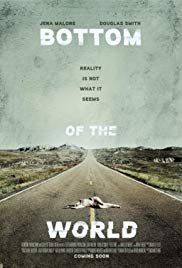
BOTTOM OF THE WORLD
US, 2017, 85 minutes, Colour.
Jena Malone, Douglas Smith, Ted Levine, Tamara Duarte,
Directed by Richard Sears.
This film starts in the spirit of realism involving its audience in the central couple, Scarlett and Alex, played by Jena Malone and Douglas Smith. They are driving through the countryside, aiming for California. When they stay at an intriguing old-style hotel, complications begin to arise.
For audiences who stay the pace, the screenplay becomes more and more intriguing, but more and more complex and puzzling. Scarlett has her moods, physical sickness, returning to the hotel, watching a rather rabid preacher on television, telling her story about tormented behaviour with her cousin. There are further complications when they discover the house where the television preacher does his filming and Scarlett refers to him as her father.
Then, suddenly, we are in an alternate world where Alex is a businessman, finds that he is at home with his wife, his friends wondering where he has been. Scarlett then appears as a next door neighbour with the preacher her father. Alex is more than puzzled and drives out into the countryside to verify some of the aspects of the story.
By the end, with the interconnection of the two worlds, the audience has to ask where the action is happening, whether it is in Scarlett’s mind, tormented with guilt about behaviour towards her cousin, what is in Alex’s mind or is he a figment of Scarlett’s guilt imagination.
Well performed, especially by Jena Malone and Ted Levine as the preacher. Puzzling and challenging.
1. The title? Which world? A world of purgatory? A world of hell?
2. Americana? Driving across the southern states? The open roads? The old hotel? The old church? Old huts? The contrast with suburbia, homes, neighbours, supermarkets? The musical score?
3. Scarlett’s story? How much real, how much in the imagination? Her memories, conscience, communication?
4. Alex’s story? How real? Driving with Scarlett, his puzzles? Listening to Scarlett’s story? The communication with the preacher? With the hooded man? The sudden change to a parallel world, Alex and his marriage to Paige, seemingly ordinary, Scarlett as his neighbour, his drive out into the countryside, the interactions with Scarlett, wanting the truth?
5. Who was Alex? In relationship to Scarlett and her story? The murder, the burial? Scarlett and her guilt? Alex and his search, digging up the grave, bewildered?
6. The role of the preacher, on television, his message, Scarlett and her reaction, her father? Alex going to visit him? His explanation of what was happening? Is recording at home, Alex interrupting? His place in the alternate world and relationship to Scarlett?
7. Alex’s wife, ordinary life, love, bewilderment at his behaviour, trying to support him?
8. The back story, Alex and his work, his work friends and their questioning of him?
9. Parallel worlds, alternate worlds, images of purgatory, images of hell, questions of sin and guilt, the consequences? Seeking identity?
Brother's Shadow
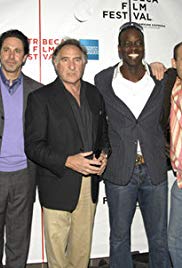
BROTHER’S SHADOW
US, 2006, 91 minutes, Colour.
Scott:Cohen, Susan Floyd, Judd Hirsch, Elliott Korte, Ato Essandoh, James Murtagh.
Directed by Todd S. Yellin.
This is a film about ordinary people, a slice of life, people in difficulties, people with hopes, people with disappointments.
The central character is Jake in the audience first meets on parole in Alaska, sent back after 10 years to his native Brooklyn, under strict parole supervision. The father of the title is revealed to have just died.
Jake, Scott Cohen, has always been badly compared to his older brother, Mike, whom he physically resembles. Their father, Judd Hirsch, has always favoured the older brother and condemned the younger, which led to the younger brother setting their furniture factory on fire and being sentenced to prison. In the meantime, Emily, and Jake might’ve married, has married his older brother and had a son.
The film focuses on the difficulties of Jake returning, wanting to do furniture job but his father sabotaging his efforts, continually reporting to the parole officer who is very strict and judgemental. Jake has a talent for making furniture, a book of designs, and begins to work in the family factory which Emily intends to sell, much to the disappointment of the father. The son initially begins to warm to his uncle but ultimately becomes the course cause of the family collapse.
It is interesting to note the Jewish background of the family, the father’s attendance at the synagogue, Jewish rituals in the workplace.
The performances are strong and will involve the audience in the characters as well is their difficulties – and, unexpectedly, the film ends not with everything tied up happily but rather more open-endedly.
1. Brooklyn slice of life? A portrait of ordinary people, struggles, clashes, relationships, hopes and achievement?
2. The title, the focus on Jake, the background story, comparison with his brother, the attitude of his father, Emily and her marrying Mike, the furniture business, Jake and his setting fire to the workshop? The comparisons?
3. Jake, in prison, parole, working with the fish in Alaska? His temper? Returned to Brooklyn? His parole officer and his strictness?
4. Brooklyn, homes and streets, the furniture workshop? Synagogue? The Jewish background and tone? The musical score?
5. Jake, his age, 10 years absent, no communication with his family? His looking for jobs? his father intervening?
6. Meeting Emily, memories of the past? Her marrying Mike, bringing up Adam? Her wanting to sell the business?
7. Jake, encountering Adam, Adam and his father, his grandfather, resentments? His interest in the furniture business? Jake, the tables, his skills, his book of designs? His going to work? His father’s negative reaction? Emily and her letting him work?
8. The visit from the buyer, mistaking the two brothers, the comments about how similar they were, the large order, the short time frame, Jake and his skills, devoting himself to the work, Adam helping, the previous helpers, the discussions, gathering them together, the hard work? Everyone tired? The completion of the task, effective, the possibilities of more orders?
9. Jake not telling the truth about himself, the discussions with the parole officer, strictness, having to move out of his accommodation, sleeping in the street, the gang attacking him, Emily taking him in? The relationship? Adam and his suspicions and resentment?
10. Adam, setting the workshop on fire, Jake trying to put it out, Adam running away? Jake drinking? The attitude of the parole officer?
11. The religious themes, going to the synagogue, the Jewish rituals in the workshop, the Bible?
12. The father, his relationship with the woman, Jake and his taunts about her, memories of his mother, his father’s infidelity, his father strictness, praising Mike, rejecting Jake?
Their playing the game with the coins? The father mellowing, beginning to appreciate Jake?
13. The ending, not the happy ending with everything tied up, Jake serving further time after his appearance in court, the audience wondering as the film ended about the future?
S.W.A.T.: Under Siege
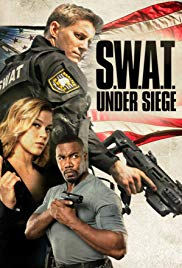
S.W.A.T.: UNDER SIEGE
US, 2017, 89 minutes, Colour.
Sam Jaeger, Adrianne Palicki, Michael Jai White.
Directed by Tony Giglio.
This is a brief action film, popular and the style of a television episode about. S.W.A.T. there had been a number of higher budget films on these themes in the early 2000s and later a full television series.
The setting is Seattle, 4 July. The film opens with the hero, Travis Hall (Sam Jaeger) called early to work. The agency has a message about an expected delivery. The squad is briefed, armed, strategy prepared, going out to the expected location. The delivery is not what was expected. And there is an extended shootout with some deaths, especially of the attacking thugs.
The package, in fact, is an individual, former partner of the gangster trying to capture him because of the information he holds, especially in a microchip. He is interrogated by the team, eventually revealing the truth, collaborating with the team as they are besieged in the S.W.A.T. headquarters. There is a vast number of mercenaries because the gangster had built up his own private army. He also has some thugs posing as FBI agents.
The chief of the headquarters seems rather unbelievable, Adrianne Palicki looking more like a model than a police officer. Which, of course, makes her very suspicious, even in her manner and dealing with the others. But, although another member of the team is revealed as in the pay of the gang, our suspicions are not without justification, especially in the final fight and confrontation.
The film also has a whole lot of technical detail, an expert in the headquarters, but the attacking force having even more expertise, leading to entrapments, shielded doors opening, infiltration…
Audiences should not put high expectations on the film, rather see it as the equivalent of a television episode, a lot of incident excitement, shootouts, betrayals, confrontations.
Sam Jaeger is a rather serious hero leader. Michael Jai.White is an imposing presence as the prisoner with the information.
Rabbit/ 2018
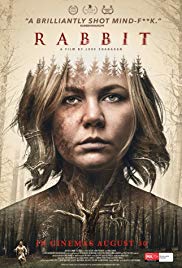
RABBIT
Australia, 2017, 103 minutes, Colour.
Adelaide Clemens, Alex Russell, Veerle Baetens, Jonny Pasvolsky.
Directed by Luke Shanahan.
Rabbit is a film from South Australia, a drama, psychological drama, touches of horror. Is a first feature film of Luke Shanahan and was well received.
The film opens with a dream – and the dreams continue throughout the film. They are more and more significant as we find that the central character, Maud, is searching for her sister, Cleo, who has disappeared.
Maud spends time in Germany, has her own physical and mental collapse and its treated in the hospital and then returned home – her parents not enthusiastic to see her again.
Because of her dreams and the mystery of her sister’s disappearance, Maud leaves home and makes a journey of pursuit and discovery. She is helped by her sister’s fiance, Ralph, Alex Russell, as well is a young Detective who blames himself for not being able to solve the mystery of Maud’s disappearance. She continues to have the dreams, more and more identifying with her sister – with Adelaide Clemens playing both sisters.
The search leads her to a mysterious commune, some strange characters, a mentally impaired large girl, mysterious boys and girls, a man without a face, adult laboratory, and a seemingly sympathetic woman who is supported by her husband. She is played by the Belgian actress Veer;e Baetens.
As the film becomes more mysterious, it is revealed at the sympathetic woman has had her own problems with her sister, has been employed by a board of management and commissioned to do experimental work on twins and their identity and identification. This leads to more harrowing experiences for Maud, discoveries about her sister, some violence and deaths, and violent ending.
Because of the complexity of the screenplay, this is a film which demands constant audience attention.
1. The title, the focus? The explanation of hunting the rabbits, holding the rabbits, trapping the rabbits?
2. The Australian settings, the bush, homes in the bush, the commune, the houses and caravans, the laboratories, the mansion? The contrast with the sequences in Germany, the railway station, the hospitals, theatres? The musical score?
3. The linear story of the disappearance of Cleo, the effect on her twin sister, Maude, Maude in Germany, her collapse, recovery, the return to Australia, the continued search for her sister, the reaction of her parents, their hostility, Cleo’s fiance, the detective on the case, Maude leaving and searching, the commune, the large girl and her information, the encounters with Nerida, her husband?
4. The dreams, the fantasies, Maude running in the bush, the events for her sister? The identification between the twins? Love, tensions, the disappearance? The compulsion for Maude to find her sister?
5. The character of Maude, her collapse in Germany and the treatment, the hostility of the parents, Ralph and the past, his continued helping, the detective and his blaming himself? Maude and the identification with her sister, sharing the same experiences, the dreams?
6. The people in the commune, friendly, sinister? Ralph and his presence, his assertion that he was trying to help? The policeman, torture and death? Ralph and his twin? The man without the face?
7. The eerie atmosphere, Nerida and her husband, welcoming Maude, getting her confidence, the growing trust? The drugs, the ward, the treatment, physical, psychological? Maude and the identification with her sister? The same thoughts, the same words, the same behaviour?
8. The group, the board of the meetings, the commission from Nerida, her own background with her sister, her motivation in force? Her husband, sinister as well as supporting? The treatment, the effect on Maude? The other children, the boy, the girl, experiments? The board wanting the forming of an identical twin?
9. Ethical issues, Nerida and her commission, her mission, her motivation, insinuating herself, her making demands, the continued process with Maude, the treatment of Cleo?
10. The board meeting, praising Nerida’s success? The effect on Nerida? Her leaving the meeting, in the kitchen?
11. Maude, the cumulation of the effect of the treatment on her, what happened to Ralph and the detective, what happened to her sister, the identification, getting the knife, stabbing Nerida?
12. The complexity of the plot, the complexity of Maude’s experience, the horror elements of physical and psychological experimentation?
Rebirth
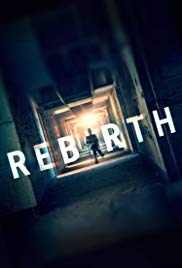
REBIRTH
US, 2016, 100 minutes, Colour.
Fran Kranz, Adam Goldberg, Nicky Whelan, Kat Foster, Andrew J.West.
Directed by Karl Mueller.
For those who persevere with Rebirth, it is intriguing, at times comic and satirical, but with an underlying seriousness and cautious message.
The program presented in Rebirth is particularly American. It has the atmosphere of all those popular media gurus who have programs of self-help, participants going away on camps to discover themselves and to reach fulfilment. It questions the motivation of these gurus as well is their qualifications and the consequences on participants in the programs. The screenplay suggests and mentions the background of cults and domination.
Kyle, Fran Kranz, seems an ordinary thirtysomething, happily married, working in an office, child, family life. A friend from his past, Zach, Adam Goldberg, suddenly arrives, trying to enthuse Kyle about the program of rebirth, eventually forcing him to participate in a program.
Watching the behaviour of those in charge of the program as well as the various sessions makes for some uncomfortable viewing for the audience. The method is to keep battering the participant with questions about his motivation, always questioning, but telling him he can always leave. Kyle becomes angry, involved, experiences different groups, there are attacks on him, while he passes other groups who seem to be meditating and doing can template of exercises. Ultimately, he has a shock in discovering Zach, hanging, trying to rescue him.
Kyle thinks he has escaped and returns home, only to find that the group already have photos of him on his wall and some the objects in his house with the Rebirth logo. And they have emptied his financial accounts.
The film ends with, Kyle completely of converted, as well is his wife, now himself and seem with Zach and various others giving testimony of the value of the Rebirth program..
Unless an audience wants to be made free of what might be thought of as a restrictive life and willing to participate in such a program, most audiences who made wary of these movements.
1. The title? American movements? Self-help? The attraction? Participants? The atmosphere of a cult? Aspects of fraud? Money-making?
2. The setting, 4 July, the family and the outing? Kyle and his wife? Their bonds? His work at the bank? At home? At work? The musical score?
3. The contrast with the Rebirth journey, going to the hotel, the room, the rebirth logo on so many objects, Kyle continuing, the bus, wanting to go on the bus, the interaction with Naomi? The bus ride, the hotel, entering into the process?
4. Zach, the past friendship, his suddenly reappearing, talking about Rebirth, his enthusiasm? Their manifesto when they were 20 and at college? Zach reinforcing it, Kyle saying that he had matured? Kyle unable to refuse? Zach organising everything? Disappearing?
5. Audience interest in this kind of group, the self-help, New Age approaches? Surrendering self to the process? The dangers? The exhilaration?
6. The film as satirical in its presentation of the process? But, at the same time, very serious?
7. Kyle’s experience, entering, the initial group, his being singled out, the humiliation, the affirmation, his being attacked? The continuous questions, the continual challenges? The effect on Kyle, mentally, spiritually, physically?
8. Naomi, her glamour, her continued questions, never answering Kyle? Her seductive presentation? Her taking him to the various rooms? His watching the various groups?
9. The range of participants, men and women, old and young, their enthusiasm, the exercises, the contemplation, the sexual innuendo? The violence?
10. The statement that Kyle could leave at any time? The locked doors? The various rooms, the challenges to him, the sexual encounter and his wanting to leave? The verbal abuse? Eventually being led to Zach, his being tied up, his wanting to rescue him? The arguments with the group, their confrontation? Second Kyle, his going into the bus, going home?
11. Arriving home, the range of photos on the wall, everything with the Rebirth logo? His wife, meeting Zach again, the pressure on Kyle? The kind of moral collapse?
12. The philosophy of the confined world, the need to break free, to be the real self, not participate in the fall’s world?
13. The year later, Kyle and his membership of Rebirth, with his wife? The enthusiasm, the video promotion, the testimonies, the talking about Kyle, his state and status in the group? His expertise? Zach and his support?
14. Kyle is returning home, finding his financial account empty? Zach’s doubletalk? And the final images of Kyle and his making money through rebirth? Through the clients? The experience of a cult?
Freres Ennemis' Close Enemies
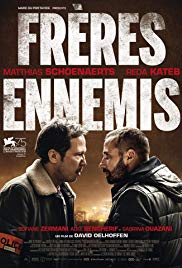
FRERES ENNEMIS/ CLOSE ENEMIES
Belgium/France, 2018, 111 minutes, Colour
Matthias Schoenaerts, Reda Kateb.
Directed by David Oelhoffen.
While the material in this police and criminal thriller is rather familiar, it is successful in its dramatisation of the central characters and their conflict.
Matthias Schoenaerts achieved an international reputation appearing in many English-language films but also appearing in films in his native Belgium. Redda Kateb was also a significant actor in Belgian films but also appeared as a hostage in Fishing Without Nets.
The two portray childhood friends but, as ever, one chooses the criminal world, the other police and detection. The man who chooses the criminal world has a Moroccan background and is a strong presence in the Moroccan community in France.
As with these thrillers, the crime focus is on drug dealing, international connections, double-crossing, murders. While Marcus (Schoenaerts) is a leader, he comes under fire, almost assassinated, needing the support of the community (and finding betrayal) and then of his old friend who enables him to discover the truth and to better himself. However, emotion and vengeance overcome him.
There are also family backgrounds for each of the central characters, Markus with his broken marriage but love for his son; the Detective and his family.
The film was directed by David Oelhoffen who also directed the dramatic film about fireman, Through the Fire with Pierre Ninny
1. .Police thriller? Friends on each side of the law? Betrayals? Resolutions?
2. The Paris settings, the Moroccan community, streets, offices, police precincts, homes? The musical score?
3. The title, Manuel and his friendship with Dress? The final photos in the credits? Childhood, growing apart, different lives, the law? Coming together? The case, friendship and trust?
4. Manuel, the Moroccan background, the community, the visits, the jokes, meals? Strong bonds? Going to the prison, the prisoner released into his community? The background of drugs, dealing, plans, betrayals? Manuel and his close friendship, his partner, the fact that he was a police informer, the attack on the car, shootings and death? The funeral in grief? The dead man’s wife and family?
5. Manual, his age, character, involvement in crime, violence? His estranged wife in the visits? Taking his son out to play, football? The visits? His wife testifying for him in the police interviews? His final visit, love for her, gratitude?
6. The complexity of the plans, the effect of the death in the car, manual and the other man turning up at the house, the decision to investigate together, confrontations, shootings, more information, discovery of the betrayal?
7. Chris, his career, his work, collaboration, his boss? His taking his own initiatives? Contact with manual? Asking him to trust? The different scenarios, Manuel allowing himself to be arrested, interrogated, freed? Chris allowing him to pursue his investigations, giving him time? Dress and the interactions with his associates, giving them information, withholding information, his boss?
8. The buildup to the climax, Manuel confronting his men talk, the betrayal, the shootings? Manuel and the police, his being wounded? Chris coming to his rescue? Manuel and
his death?
9. Familiar elements of the story, interestingly portrayed?
Bad Boys for Life
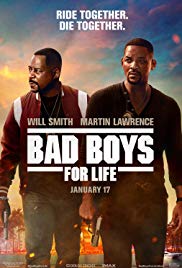
BAD BOYS FOR LIFE
US, 2020, 124 minutes, Colour.
Will Smith, Martin Lawrence, Vanessa Hudgens, Alexander Ludwick, Charles Melton, Paola Nunez, Kate del Castillo, Nicky Jam, Joe Pantoliano, Jacob Scipio, Theresa Randle.
Directed by Abdil and Billal.
Whew, talk about action! And that is only for the first 10 minutes!! Our heroes drive, seemingly at 100 mph, weaving in and out of the Miami traffic with reckless enthusiasm, only for the episode to finish up with a joke about babies.
Will Smith and Martin Lawrence made such an impression in 1995 with Bad Boys that they have remained in the imagination of the cinema audience for so long, enjoying a sequel in 2003. It seems amazing that it has taken 17 years for this third film in the series to reach the screen.
The two films were directed by Michael Bay who has built up a reputation for non-stop action, non-stop loudness (and that is just for the Transformer movies). He is not at the helm of this film. But the two directors, from Belgium, must be his most ardent disciples because they have not spared any effort in outBaying Michael Bay in terms of fierce and fast action. Unless you have a heart condition and are cautious about over excitement, you can’t help but being caught up in two hours of sometimes breathless action. There are some dramatic pauses, giving more background to the characters and the situation created here, but, then off we go again.
Mike and Marcus, Will Smith and Martin Lawrence, are still in Miami, but certainly not as young as they used to be. Marcus is certainly heavier and slower. He taunts Mike with dyeing his beard. However, they have their song about Bad Boys and declare that they are Bad Boys for life.
This, of course, is sorely tested. The audience is transferred from Miami to Mexico City violently to a prison laundry and a criminal matriarch on the loose, with a son in his early 20s, born in prison, both remembering his father who died there, breathing vengeance (that’s a bit of an understatement) on all who were involved in the case. There is a series of assassinations, lawyers, judges, police – but, it is revealed, the most blamed is Mike, to be killed last so that he suffers most. However, the son jumps the gun, that is fires the gun, wounding Mike, upsetting his angry mother.
Which brings us back into Miami police and action, Joe Pantoliano repeating his turn as Captain Howard, but setting up a new squad of experts for police investigation, Mike wanting to be part of it, his not being allowed, but permitted to go along. His interpretation of this permission of surveillance is to leap out of vehicles, confront suspects violently, going to action in a gaudy nightclub, exasperating the powers that be. But, the members of the squad are an interesting group with action expertise, strategies, computer skills, and a young man who can give the impression of being a swinger.
After the attempt on his life, Mike confides in Marcus and the audience with an intriguing story about his action before the two Bad Boys met, explaining why he is the target of the Mexican vengeance. Will Marcus, who is now a grandfather and who is studying non-violence, help Mike when he goes to Mexico? A rhetorical question, of course!
It all builds up to a huge confrontation in Mexico City, elaborate shootouts, rescuing Marcus as he hangs from a building, build up to a stand between Mike and the mother, some revelations for her son, and a huge apocalyptic conflagration.
Who could ask for anything more? An exemplary archetype for a 21st century action film. And, there is a tantalising final moment to indicate the plotline for the next sequel.
1. The popularity of the original film? 1995? Sequel, 2003? Cult films? The importance of Will Smith and Martin Lawrence, screen presence, bonding? Director, Michael Bay and his action style?
2. The sequel presupposing the past, Miami, the police work, the captain? Working as a team, the bonds, going into action – and beyond!
3. The directors, in the tradition of Michael Bay, a model for an action show, 2020 action, pace, editing, dramatic pauses, then on again, the opening, cars at 100 miles an hour, and the baby joke? Setting the tone? The musical score?
4. Age, Marcus and weight, Mike dyeing his beard? This stage of careers, strong friendship, issues of retirement, Marcus becoming a grandfather, relations with his wife, the wedding ceremony and speeches? Mike, his life, alone? The irony of the later revelation about his son?
5. Mexico, the harshness of the prison, Bill, the laundry sequence, law, action, violence, the escape? The discussions with her son? The plan, vengeance for all those who put her husband in prison, wanting them to suffer, wanting Mike to suffer most? The communications between Mexico City and Miami?
6. The plan, the designation of the variety of targets, lawyers, judges, police? The executions? The eventual death of Captain Howard? Mike and his cavalier attitudes? The race with Marcus, his being shot? In hospital, the six months and recuperation, Marcus at his bedside?
7. Marcus, happy in retirement, Buddhist contemplation, nonviolence? Yet the two being bad boys for life? Their theme song? The wedding, Mike’s recovery?
8. The setting up of the special squad, Captain Howard in charge, Rita and the introduction at the bar, possible bonding for Mike? The members of the squad, the variety of skills, Kelly and her toughness, Dorn and his having killed someone, therapy, his skill with computers? Rafe, the man about town, swinging, at the clubs?
9. Isabel and her son, the confrontation with other members of the drug gangs, the executions, the takeover? His mother’s domination? Shooting Mike? His mother upset, her order to leave Mike to last, the most suffering?
10. The explanation of the back story, Mike’s explanation, infiltrating the drug dealers in Mexico, the relationship with Isabelle, sexual encounter, the going to prison, his opting for police work, not knowing about his son?
11. Mike in action, told to be on the sidelines, his continually stepping forward, the captain and his frustration, Rita and her frustration? Villains, getting out of the van, engaging in action, the behaviour at the nightclub? The information about the bullets, the supply? The siege, the death of the dealer?
12. The clash with Marcus, the issue of violence and nonviolence, Mike and his being pigheaded, wanting support? Marcus going to Mexico, the jokey plane trip and the changing of seats during the criminal narrative?
13. Mike, the plan, tracking down Isabel, the key phrase that was theirs, meeting, her power, the background of witchcraft and prayer? The story, wanting revenge?
14. The final setup, a conflagration, Rita and the squad, Marcus, the shooting, the fire?
15. Isabel and her son learning the truth, his reaction, saving Marcus from falling? Bonding with his father? The shootout, Rita and Isabel’s death?
16. The end, everyone reunited, bonding, the life, Mike going to see his son in prison – and their combining for a possible sequel?
Hidden Life, A
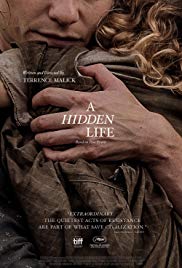
A HIDDEN LIFE
US/Germany, 2019, 174 minutes, Colour.
August Diehl, Valerie Pachner, Maria Simon, Karin Neuhauser, Tobias Moretti, Ulrich Mathes, Matthias Schoenaerts, Franz Rogowski, Karl Markovics, Bruno Ganz, Michael Nuqvist.
Directed by Terrence Malick.
The title comes from a quotation, George Elliot in Middlemarch. It highlights the power of small and hidden lives, their power for good and its effect. The quotation rightly applies to the Austrian conscientious objector to his country's involvement in World War II, to the oath of loyalty that each soldier was required to make to Adolf Hitler himself. for the growing good of the world is partly dependent on unhistoric acts; and that things are not so ill with you and me as they might have been, is half owing to the number who lived faithfully a hidden life, and rest in unvisited tombs
This is the story of Franz Jagerstatter, the Austrian farmer who was prepared to go to prison, prepared to die for his convictions, the conscientious objector against Hitler and the war. While the film shows his Austrian Catholicism, his life of faith and devotion, the advice he seeks from the parish priest as well as from the Bishop, the screenplay does not name his Catholicism so explicitly. And, at the end, there is no indication that, in fact, Franz Jagerstatter was beatified by Pope Benedict XVI in 2007, a strong witness to the injustices of the war. Jagerstatter is the Catholic stance while Dietrich Bonhoeffer, Lutheran pastor, is the Protestant witness to anti-Nazi defiance.
This film, running five minute short of three hours (which some reviewers and audiences have found rather long, languorously long) has been directed by the celebrated Terrence Malick and so has received more extensive release.
While A Hidden Life does tell its story in a continuous linear screenplay, Malick has never been a conventional storyteller. While he has a deep admiration for Jagerstatter and his stances and his faith motivations leading to ultimate self-sacrifice, Malick is something of a visual poet. With Italian mountain locations standing in for Austria and Jagerstatte's village of St Radegund, so much of the film, with his using widescreen lenses, invites wonder and contemplation. Jagerstatter comes from a beautiful natural world, lives in harmony with it is a farmer, but is prepared to leave it because of principle and conviction.
He is portrayed by German actor, August Diehl, who makes a convincing character. He is matched by Valerie Pachner as Fani, his wife,. We see their courtship, their marriage, having a child, the hard work in those beautifully-shot fields, with the mountain backgrounds. We see their life with other people in the village. We see them at church.
Perhaps this should have been mentioned earlier, but the opening minutes of the film have substantial and disturbing footage from the 1930s, Hitler and his entourage, public rallies, his speeches, the adoring public, the spirit of Heil Hitler. Obviously, this creates an initial atmosphere for this story. So, Franz goes to a neighbouring town for military training, bayonet practice, encountering a friend who is a conscientious objector. When Franz returns home, he is troubled, sharing this with Fani, but their becoming victims of derision by their fellows, being vilified, finding it difficult to sell their produce (though some sympathy from the few older women). Fan's sister, unmarried, comes to live on the farm and help with the work but strong moral support. Frantz's mother, hostile to Fani, also lives there.
It is no surprise when Franz is called up, refuses the salute and the oath, is imprisoned, interrogated, mocked, treated badly. Fani tries to organise a visit to him but is baffled by bureaucratic manipulation. However, the screenplay relies on excerpts from their many letters, declarations of conviction, loving support, spoken in voice-over by the couple.
A lot of the second part of the film is spent in prisons, especially with the transfer of Franz to Berlin, the range of prisoners there, the maltreatment, interrogations, torture, squalid cells, time in the yards, the witnessing of executions. There is the pathos of their not being allowed to touch when Fani, accompanied by her father, is eventually allowed to see her husband in Berlin.
And, it is jolting for the prisoners to witness executions, a guillotine, and jolting for audiences to watch the men going to be killed. Martyrdom is demanding.
Terrence Malick, making this film in his 70s, drawing on his expertise in filming even drastic circumstances with beauty, exploring the nobility of the human spirit, has given this 21st-century world a witness to faith and heroism, for which we can be grateful.
Winner of the Ecumenical Award, Cannes, 2019.
1. The title? The quotation from George Elliot and its relevance? Quiet lives and their impact?
2. Audience knowledge of Franz Jagerstatter? The film as biography, portrait, conscientious objector, martyr, saint?
3. The work of the director, his interest, religious and transcendent themes? The strong visual style? Portrait of nature? Studies of imprisonment? The range of lenses, widescreen, their affect?
4. The poetic style, long and languorous, a style of narrative, audience involvement and response, interest, contemplation?
5. The locations, Italian mountains for Austria? The village of St Radegund, the background of the mountain vistas, the fields and the harvests, the forests, work in the fields, the home, the barn and animals, the village, the streets, the church?
6. The village and the military training? The prison? Berlin, the city, the jail? Interiors, the cells, the yard? Executions?
7. The place of beauty, nature? The musical score? Chant, religious hymns, joyful songs?
8. The importance of the prologue, the introduction to Hitler, the visuals of the Nazis, Hitler and his behaviour, the mass followers, taking Germany and Austria into the war?
9. August Diehl, Valerie Pachner as Franz and Fani? Audience sympathy and interest? Identifying with them? The screen presence, love, courtship, the motor bike, the wedding, the birth of the child, simple lives, poverty, hard work, Catholic faith, practices, devotion?
10. The only sister, unmarried, the farm, her continued hard work and support? A solace for her sister? Franz's mother, difficult, her place in the house? Fani's father, his helping her with the trip?
11. The situation, the outbreak of the war, the role of Austria? The call up for the men? Right and wrong? Franz and his going to the training, meeting his conscientious objector friend, the military officers, their influence, manner, the bayonet practice? The preparation for the call up?
12. The changing attitudes in the town, the drunken Mayor and his scoffing, the military presence, the exercises?
13. The role of the church, the priest, friendship, sense of duty, parish life, his advice, accompanying Fani? Issues of conscience? The significance of the visit to the Bishop, the explanation of the case, his advice, the church and the accommodation to the regime?
14. Fani, joyful and loving, her dealing with her husband's belief? Franz, his concern, the significance of the Heil Hitler, the oath of loyalty to Hitler, his questions, wrestling with the issues? The consequences, the family despised by the townspeople, his going to prison? The challenges to him, whether he was focusing on himself, abandoning family?
15. The people turning, the treatment of Fani, the food and sales, the difficulties, spitting in condemnation, vilifying? The consequences for the family? The hard work, yet some of the old women and their support?
16. Franz going to report, refusal to take the oath, the other men, the authorities, in prison, treatment, its being tested, his convictions, prayer and rosary?
17. Fani, travelling to see her husband, the difficulties with the visit, the officer and his drawing on officialdom and regulations?
18. The continued correspondence, the letters, the voices, attentiveness each to the other?
19. The transfer to Berlin, the drive, the train, the prison, the other prisoners, the conscientious objector and his friendship, possible plans for escape, interrogation, torture? The appointment of the lawyer, his speeches, Franz refusing collaboration? The lawyer frustrated?
20. Franz and his conscientiousness, sense of mission, the prospect of death? Watching the executions? Graphic for the prisoners, graphic and wrenching for audiences watching?
21. The significance of the letters, communication, morale? Fani and her father, travelling to Berlin, her experience, the return? The difficulty of the meeting, no touching, the farewell?
22. The mother, her reconciliation with Fani?
23. The executions, guillotine, Franz executed, the state of the war in 1943, his expected to be forgotten, not forgotten, his conscientious stand? Pope Benedict XVI beatifying him in 2007?
Color Out of Space

COLOR OUT OF SPACE
US, 2019, 111 minutes, Colour.
Nicolas Cage, Joely Richardson, Madeline Arthur, Elliott Knight, Tommy Chong, Brendan Maher, Julian Hillyard, Josh C.Waller, Q'orianka Kilcher.
Directed by Richard Stanley.
At times more than spaced out!
Here is an adaptation, 21st-century interpretation, of a short story by celebrated horror and supernatural writer, H.P.Lovecraft. Although Lovecraft died in 1937, his stories have been continually popular, some film versions in the late 1960s and an ever-increasing number of adaptations, especially of short stories, from the 1980s to the present, over 200.
The Lovecraft story here has been adapted by South African director, Richard Stanley, who made an impact in 1990 with Hardware, made a few feature films but fell foul of Hollywood in being sacked from the 1996 The Island of Dr Moreau. This is his first feature film since then although he has been busy with documentaries.
This might be described as an ever more-weirdening film.
While we start with an American nuclear family living out in the woods, escaping from the city, managing their own farm (cultivating and milking llamas), there is something of an eerie voice-over introducing us to the remote woods where they live, suggesting something will threaten.
We get something of an intimation of this when the teenage daughter, Lavinia (Madeline Arthur) is seen performing witchcraft-like rituals and incantations in the forest – but, concerned with the healing of her mother’s illness. She has a younger teenage brother, Benny, who smokes pot and gives the impression that he is generally unreliable. This contrasts with the little brother, Jack, bespectacled, reading, a little intellectual.
But, Nicolas Cage has top billing. In recent years he has made almost 5 films per year, lots of thrillers, many of his characters manic, so that it is difficult to discern whether he is acting manically or his character is becoming ever more mad. He is the father, resenting his overbearing father from the past, yet beginning to repeat the patriarchal domination. His wife is played by Joely Richardson, working from home, a strong-minded character, devoted to her children, but with the terminal illness.
That might seem enough to work on. However, there is more, much much more.
Suddenly, in their yard, there is a close encounter of the whatever kind. A mysterious spaceship, a huge hole in the ground, bright lights, colours out of space. We never see the creatures who have descended to earth nor do we know what their mission is. However, they proceed to wreak a lot of havoc. At first, the family explores the mystery, dad even going on television though making a bit of a hash of his interview. Lavinia has also encountered a student who is doing investigations of the terrain and its water content, Ward (Elliott Knight). He is called in for some expertise by the Mayor and the sheriff.
And, from there, everything goes downhill for the family. If we hadn’t realised before, this is a horror variation on the close encounter theme and the consequent madness and destruction of the family. If the arrival of the spacecraft seemed a touch apocalyptic, then the immediate consequences on the family are visualised as apocalypticer. And, not to be outdone, the film goes into full throttle of weirdness and madness, apocalypticest! There are quite a number of disturbing visuals, the ill mother on the couch gradually absorbing her little son, the llamas going berserk, and death and destruction all round.
After the press preview, some of the reviewers were discussing and condemning this film as if it were claiming to be high, intelligent drama. It is obviously not. It is for the horror-fest fans and made accordingly. A bit too much for mainstream audiences – but it should be very popular with the horror devotees.
1. The popularity of the writings of the H.P.Lovecraft, the various film versions? The horror imagination? The supernatural?
2. The title, space and close encounters, the impact of colour and colours, a 21st-century interpretation?
3. The family, moved from the city, setting up about their own life, the farm, self-sufficient, the llamas and their milking, the other animals? A nuclear family? The bonds? And their gradually being disrupted?
4. The voice-over, the description of the locations, nature and the forests, the isolation, the house and the farm? The musical score?
5. The father, his skills, love for his family, yet patriarchal, severe in his judgements, his moods? The mother, her work at home, business, Internet connections? Her frail health? The cancer? Lavinia, seeing her in the woods, her dress, the rituals and incantations, the touch of witchcraft, her mother’s illness? Benny, teenager, drugs, his place in the family, subject of criticism? Jack, his age, glasses, imagination, the bond with each parent? Ordinary lives, meals, quarrels, Lavinia wanting more freedom, her father’s reaction?
6. Ward, his role in investigating the land, the water? Coming across Lavinia? The attraction? His return?
7. The neighbour, his heart in the woods, his eccentricities, friendship with Ward, discussions? The horror of his death?
8. The close encounter from space? The spacecraft, the audience not seeing any space creatures? The effect of the landing, the power, the colour, atmosphere? The initial destruction, the hole? The immediate reaction, the calling of the police? The television, the reporter, the interviews? Nathan and his awkwardness on camera? The mayor, the background of her wanting the property, the sheriff? Relying on Ward for information?
9. The consequences of the close encounter, Nathan and his moods, increasing madness? Presence and absence? The treatment of his children? Loving, then holding them at a distance, criticism? Greater seclusion? His response to Theresa, her seemingly being possessed? Her upset about her work? With Jack? Holding him, the eerie process of her gradually absorbing him? Her wanting to die? Nathan and the gun?
10. Lavinia and Benny, trying to deal with the situation, the father and the llamas, the milking, rounding them up, their becoming loose again? His anger? His withdrawal?
11. Lavinia and Benny, their planning to leave, ready, packing, unable to go?
12. Ward, his return, his shock at what it happened? The horror, the deaths in their manner?
13. Ward, the future, his being the voice-over, reflection on what had happened and the consequences?
Like a Boss
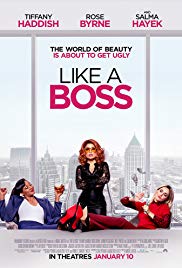
LIKE A BOSS
US, 2020, 83 minutes, Colour.
Tiffany Haddish, Rose Byrne, Salma Hayek, Jennifer Coolidge, Billy Porter, Ari Graynor, Ryan Hansen, Karan Soni, Jimmy O.Yang..
Directed by Miguel Arteta.
For more than a decade, raucous and raunchy American comedies have been very popular. Audiences seem to identify with the characters, enjoy the situations, the touch of the outrageous, elements of vulgarity, elements of explicit sexuality, even more elements of innuendo. And, Rose Byrne has been in quite a number of them, Bridesmaids, Neighbours, Neighbours 2… And then, in recent times, Tiffany Hadddish has specialised in them making quite a splash in the raucously popular and unrestrained, Girls Night.
This brief film is rather more low-key than usual, although Tiffany Haddish does her best to keep the action rolling and Rose Byrne has to act as a desperate character for so much of the time.
This is very much a women’s film. There are only four male characters throughout, a boyfriend, and yes-man to his dominating boss, and two men who are inventors of cosmetics. They are in no way essential to the plot!
So, we focus on two friends from their high school days, Mel (Rose Byrne) and Mia (Tiffany Haddish). They have built up a small company, developing cosmetics, manage a boutique store where Jennifer Coolidge and Billy Porter work, adding a touch of comedy.
The main drama of this comedy is the ambition to take over the company by a most obnoxious boss, played with full flair by Salma Hayek. She has a cosmetics empire, has her eye on some of the women’s products, is unscrupulous in her manipulation, working on the principle of divide and conquer – which she does. However, the audience is on side when the two friends tell each of the truth about themselves, reconcile, get their employees to do some cosmetic inventing, take over a presentation and win over everybody as they upstage their boss, their boss no longer.
All very slight, very short, a surprise from director Miguel Arteta who has made some more substantial films in the past like The Good Girl with Jennifer Aniston.
1. The title? Companies? Authority? Bosses and their behaviour?
2. Broad comedy, the touch of the raucous, the touch of the raunchy?
3. The settings, apartments, shops, business offices, gala presentations? The world of cosmetics and advertising?
4. The cast? Their backgrounds in comedy? Broad style?
5. The film? Women, friendships, interactions, rivalries? The four men in the background?
6. Mel and Mia, as characters, their friendship, from the past, working together, African-American? and white, living close by, the strong bonding? Their enterprise? Working together, the company, the cosmetic inventions? The shop? Sydney and Barrett, their work, friendship?
7. Claire Luna, the businesswoman, dominating, sacking her lifelong friend (and this coming back to defeat her at the end? Her yes-man and his continued interventions? Coming to the shop, the invitation for Mel and Mia to arrive, the haughty receptionist, the eventual meetings, the discussions, Claire dominating the discussions, Mel and her ambitions, wanting to please Claire? Mia and her instant dislike, resistance?
8. The discussions between the two friends, who was persuading whom? Their falling out, the building up to a reconciliation, admitting their mutual faults? Sydney and her interventions? Barrett and his being sacked by Claire, his coming to the rescue?
9. Claire, wanting the company, financial deals? Her relying on the two men and their inventiveness? The presentation and its failure? The men winning the contract?
10. The final presentation, drawing on the women and their friendship, their scenes together and support? The visuals? Barrett and his dominating? Trapping Claire, her having
to affirm them?
11. Success of the final presentation, everybody on side, defeating Claire? One year later and success?